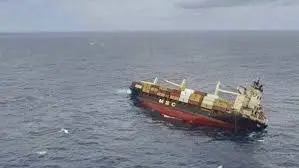Containers from capsized ship spotted along Kerala coast, govt asks people to stay away

Kerala’s serene coastline has entered crisis mode. Containers from the sunken cargo vessel MSC ELSA 3 are now reaching the shores. The ship sank on May 24, 2025, nearly 38 nautical miles off the coast. It was traveling from Vizhinjam to Kochi.
MSC ELSA 3: What Went Wrong?
The Liberian-flagged MSC ELSA 3 carried 640 containers, including 13 with hazardous chemicals and 12 with calcium carbide. Calcium carbide reacts dangerously with water, producing flammable acetylene gas.
The ship also held 450 metric tonnes of fuel, including diesel and furnace oil. This raises fears of both chemical exposure and a massive oil spill.
Containers Drift to Kerala’s Coastline
Over the past two days, containers have washed ashore in Kollam, Alappuzha, and Ambalapuzha. Some residents spotted them and went closer out of curiosity. The government responded quickly, warning people to stay away.
Officials asked the public to maintain a 200-meter distance from all containers. Some of them might leak toxic substances or explode under certain conditions.
A disaster management officer said, “These containers are not safe to approach. We’re focused on keeping people away until specialists arrive.”
Government Launches Emergency Response
The Kerala government called an emergency meeting. Key departments like the Indian Coast Guard, pollution control board, and disaster response forces joined.
The Coast Guard deployed ships and aircraft equipped with oil-spill response gear. Rapid Response Teams (RRTs) began locating and removing floating containers.
Police and fire personnel now patrol the beaches. They aim to ensure public safety and prevent any mishandling of washed-up cargo.
Chief Minister Pinarayi Vijayan said, “Our priority is to protect people and marine life. Please follow all official safety instructions.”
Environment at Risk
Experts warn that Kerala could face an environmental disaster. The Indian National Centre for Ocean Information Services (INCOIS) predicts that oil slicks may reach Alappuzha, Karunagappally, and Arattupuzha within the next 48 hours.
Marine biologist Dr. Radhika Menon expressed concern. “Oil spills harm coral reefs, poison fish, and disrupt the ecosystem. Chemicals like calcium carbide can make the situation worse.”
She added that the coast is home to sensitive marine habitats, and even minor pollution can have lasting effects.
Impact on Fisherfolk and Coastal Livelihoods
Local fishing communities now face an uncertain future. Fishermen rely on daily trips to earn a living, but many now fear the waters.
“I saw oil patches floating near our boats. We’re scared to go fishing,” said Ravi Nair, a fisherman from Neendakara. “But without fishing, we can’t support our families.”
Officials are considering financial relief for those affected. However, no compensation plan has been formally announced yet.
Public Safety Measures Announced
The government has issued safety guidelines:
- Do not touch or open any washed-up container.
- Report any container sighting to emergency number 112 immediately.
- Avoid swimming or fishing until further notice.
- Stay clear of oil slicks or strange odors.
- Follow updates from local news and disaster teams.
These steps aim to prevent accidents and reduce exposure to dangerous substances.
What Happens Next?
More containers may reach the coastline. Changes in wind and ocean currents could spread debris across new areas. Teams are working around the clock to recover containers and clean up oil traces.
The Coast Guard plans to inspect the wreck site for further leaks. Specialized divers and remote-operated equipment will help assess the damage and risks.
Environmental agencies are preparing for shoreline cleanup. Several non-profit groups have offered to monitor marine wildlife and water quality.
Final Thoughts
The sinking of MSC ELSA 3 has triggered a major emergency for Kerala. With toxic cargo and oil at risk of spreading, swift action remains crucial. Authorities are working hard, but the public must stay alert and follow safety guidelines.
This crisis shows how fragile coastal ecosystems are—and how quickly they can change due to human error or natural disasters. Cooperation between officials and communities will decide how well Kerala handles this challenge.






